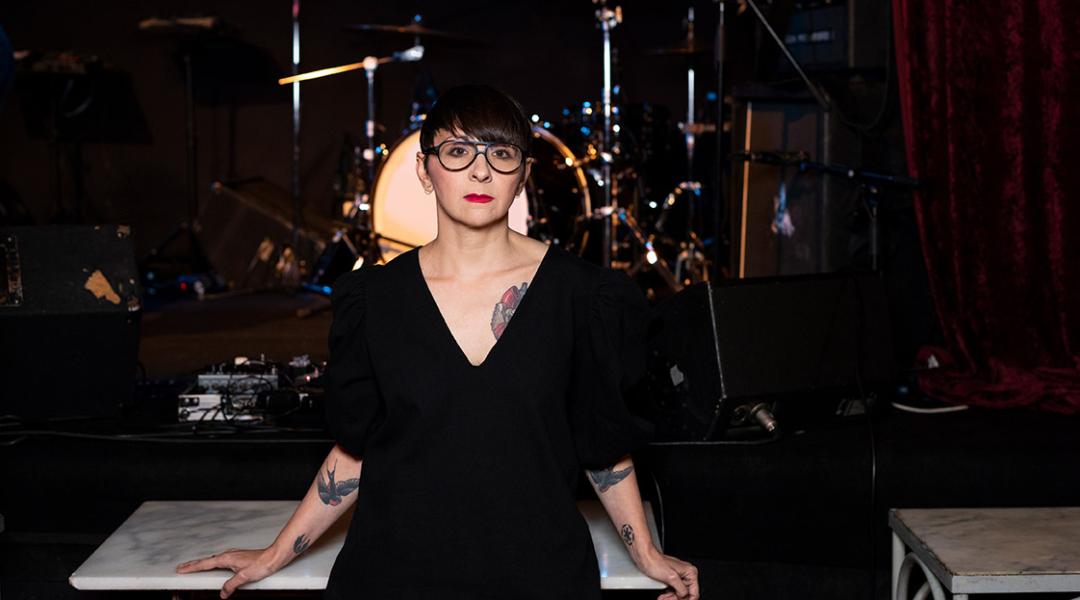Almudena Heredero
Cultural Management, Music, and Equality

Because of her experience, market vision and knowledge, Almudena Heredero has played a part in the necessary renewal that the Spanish music industry has undergone over the past ten years. Among the changes are, of course, women’s fight to gain visibility and equality. We chatted with her.
“It was all a matter of prioritizing talents,” says businesswoman, cultural manager and teacher Almudena Heredero (Madrid, 1971) when she talks about her beginnings in the music world. “Between the age of 20 and 24, I played with my brother in an electronic band called Ballet Mecánico. I was also a Fangoria dancer during the early years of the duo. But I’m well aware of my own limitations and I realized in good time that my future would not follow that path. My talent is to coordinate, organize and manage, which I love doing.”
As a result of that decision, Heredero is today one of the women with greater presence and weight in the Spanish music industry. In 2010, she founded Ulalume, a company with which she coordinated the setting up of the Spanish pavilion at the Prague Quadrennial of Performance Design and Space, as well as the Social Inclusion in Performing Arts Conference. She has also promoted events such as Primavera Pro and, since autumn 2019, she is acting as the vice president of the Women in the Music Industry (MIM) association.
You trained as a criminologist, but for years you have been working as a cultural manager and teacher specialized in that area. What was the path to get here like?
I wasn’t really sure what I wanted to study because I didn’t have a vocation for anything in particular. I decided on Law, which I found out I didn't like at all so, when I was in my junior year, I switched to Criminology. I have a degree in Private Investigation and Criminology, but I have never worked in those fields. I took up a job on a record label to pay for my degree and ended up staying in the sector. While on that label, I was called by Fundación Autor to work at the Music Awards, which I did until 2010.
“Nobody pays attention to how boys in a band dress, but on the stage all the physical traits of a woman are questioned and judged, as we see daily in the media”
When you left, you founded the company Ulalume. What do you do exactly?
I didn't want to go back to working for anyone else, so I created my own company to manage several projects. The first one was Primavera Pro, where I’ve worked for 11 years, and then there’s the Jazz Madrid festival. The Ulalume team is all made up of women, and not because I felt compelled to only have women working in my project. I think there is a common way of understanding the working process, that has a lot to do with caring for each other and with the way we address relationships.
Can we talk then about an essentially feminine way of working?
Women work in a particular way in the same way that there’s a certain work dynamic, especially in the music sector, that is very masculine and which, in most cases, women don’t share or share almost by imposition because that’s not how we work. And I mean all those work lunches, the never-ending meetings, the going out for drinks… There is also a broader, deeper feminine look at the things that we do every day. Men sometimes are less thoughtful. They may know how to sell themselves better or they may have a greater ability to develop strong bonds between them. Anyway, I don’t like to generalize because there’re people who act in one way or another according to their personality.
As a teacher, to what extent do women attend these activities?
In most of the master's training programs in which I teach cultural management or the trappings of the music industry there is a clear majority of women. There will probably be more professional women in the music industry in the future, but in the artistic side of it, men are still the majority. For women, becoming professional musicians is more complicated. Going from being an aficionado to dedicating yourself professionally to music involves overcoming all kinds of barriers — educational barriers, lack of role models. In the artistic side of music, there’s still no equality.
“There will probably be more professional women in the music industry in the future, but in the artistic side of it, men are still the majority”
Why do you think is that?
There’s a double standard regarding the possibilities a woman has to dedicate herself to music. There’s this issue concerning their technical ability to sing or play an instrument, but also their image and other things. Parents don’t see it as a serious sector for a woman. Nobody pays attention to how boys in a band dress, but on the stage all the physical traits of a woman are questioned and judged, as we see daily in the media. And that’s a lot of pressure. Developing a career in such an environment is not easy. I guess it isn’t easy anywhere, but especially in music it’s very hard. And if to the difficulties in this sector you add all the criticism in social networks, it can be very devastating.
You are vice president of the MIM association. What are your goals?
At the moment, we are putting a lot of effort in promoting changes in the election of candidates for public institutions and advocating for more equality. We are also working on a survey on the situation of women in the music industry. Until recently, there was this perception that there were no equal conditions, but we didn’t have the data. Our goal is to ultimately disappear. Hopefully, the day will come when we won’t be necessary anymore.



